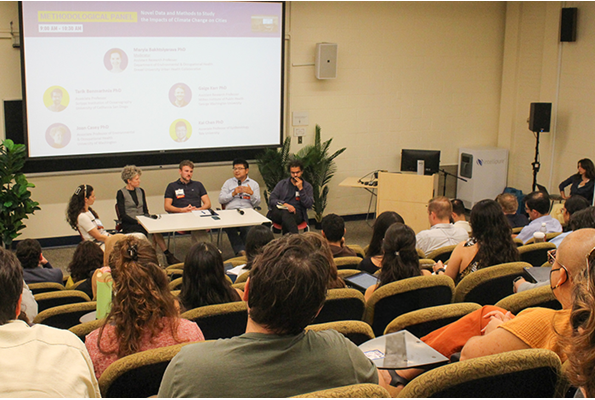CCUH Capacity Building and Events
The CCUH develops and implements training activities for our team members and the broader climate change and urban health community. These activities are meant to develop capacities for research, research translation, and evidence-based policy development around extreme weather events and urban health. Some of our training activities include webinar and invited speaker events to host experts to present on the latest research in the field, our monthly journal club to review published literature and examine research methodologies, and the learning community for a broad and collaborative exploration of extreme weather events and health topics.
Sign up for our newsletter to learn more about upcoming events and other CCUH activities.
CCUH also holds workshops to dig deeper into topics ranging from research methods, grant writing, to skills for research dissemination. Below is a sample of some of the workshops CCUH has offered.
- Climate Change for Urban Health Researchers: Offered as part of the Drexel Urban Health Collaborative’s Summer Institute, this first workshop of the CCUH introduced the different climate-related health exposures, analytical methods for quantifying these exposures, and policy interventions.
- Strategies for effective dissemination, engagement, and tracking: This Research Translation workshop provided participants with background and practical tools for communicating research findings to communities and policymakers.
- Data & Methods Workshop: Advanced analysis of the health impacts of extreme weather events. This workshop trained participants in the use of analytical models to measure the impacts of extreme weather events . The instructors focused on three specific analytical approaches: conditional Poisson regression models, case-time series, and effects of discrete events.
- Quasi experimental methods for climate epidemiology: This was an advanced course that covered classical and modern quasi-experiment methods and their applications to study the impacts of extreem weather events.
As of September 2025, CCUH is in the third year of the project and will continue activities until the project’s completion in May 2026.
CCUH will continue capacity building activities, including webinars, co-sponsored with the SALURBAL-Climate project, and an invited speaker. Webinars will focus on communicating research and the impacts of extreme weather on health. CCUH will support training activities, including workshops on research methods to study extreme weather and health, and on grant writing. CCUH holds regular statistics office hours and journal club for team members to review statistical methodologies and research literature, respectively.
Community and policy engagement activities, such as the Community and Policy Advisory Board will continue, culminating in a research dissemination event to meaningfully engage stakeholders in the launch of CCUH research findings. CCUH is also developing outputs on policy opportunities to address extreme weather and health in cities.
Activities 2025

On September 3, 2025, the CCUH participated in the Climate Change and Urban Health Pre-symposium: A Focus on the Future at the Drexel Dornsife School of Public Health. The CCUH sponsored the Methodological Panel: Novel Data and Methods to Study the Impacts of Climate Change on Cities.
The panel was moderated by Maryia Bakhtsiyarava, PhD, Assistant Research Professor of Environmental and Occupational Health at the Urban Health Collaborative. It featured presentations from:
- Tarik Benmarhnia, PhD, Associate Professor, Scripps Institution of Oceanography, University of California San Diego.
- Joan Casey, PhD, Associate Professor of Environmental and Occupational Health, University of Washington.
- Kai Chen, PhD, Associate Professor of Epidemiology, Yale University.
- Gaige Kerr, PhD, Assistant Research Professor, Milken Institute of Public Health, George Washington University.